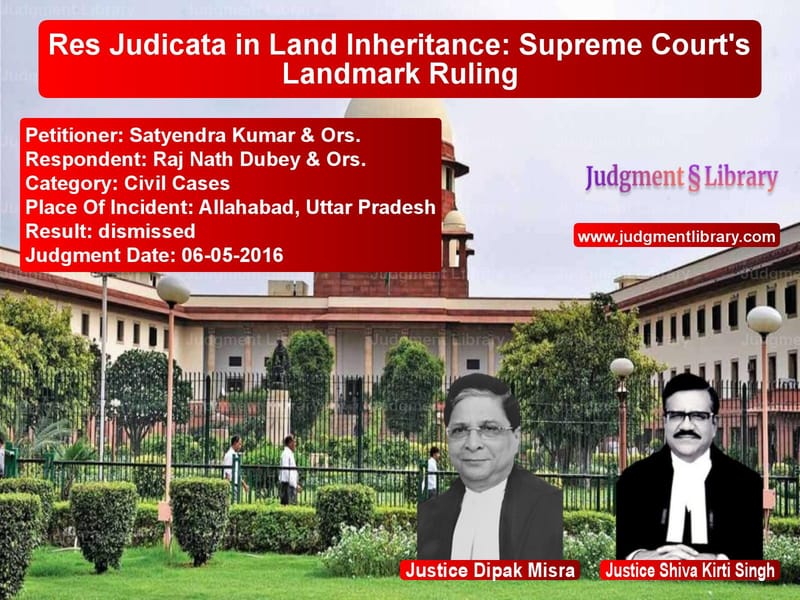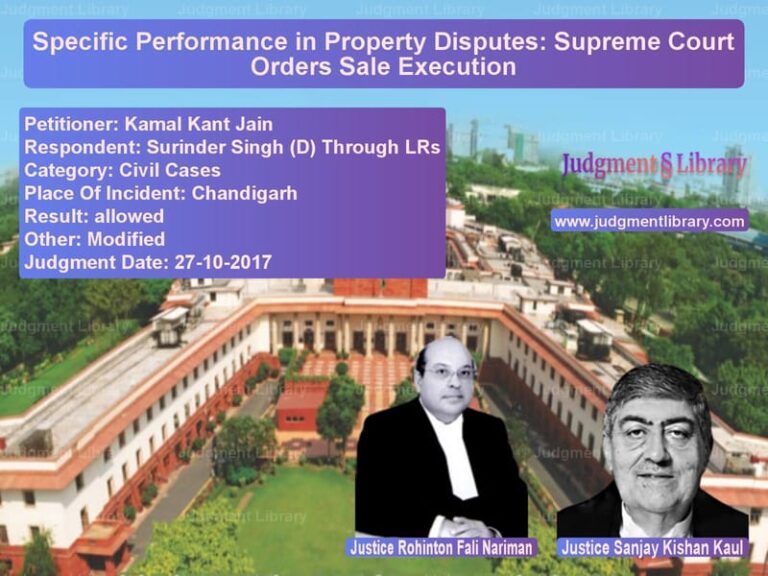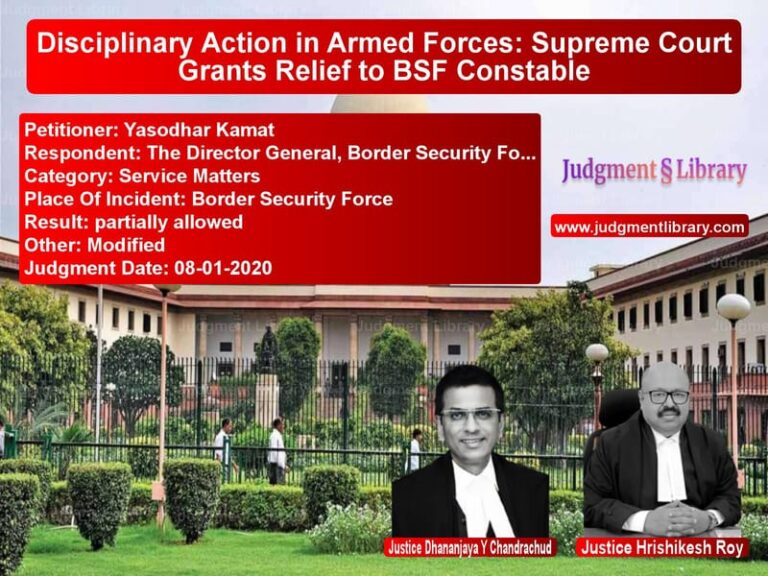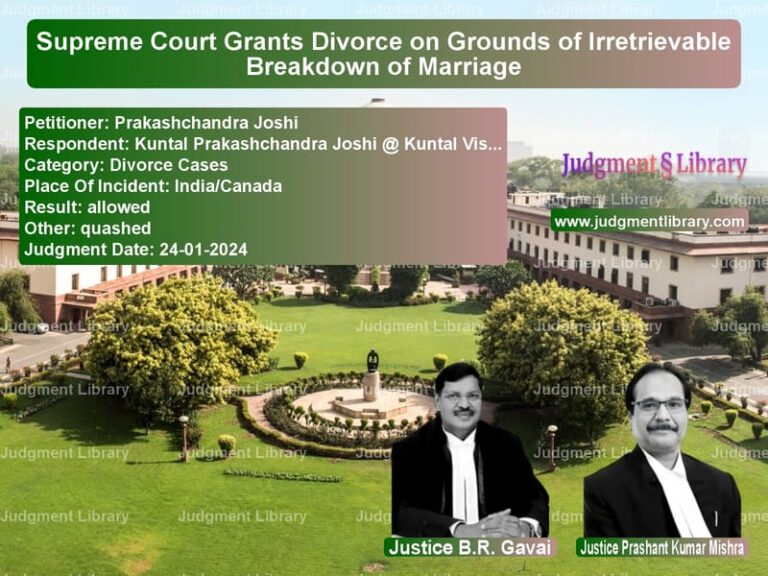Res Judicata in Land Inheritance: Supreme Court’s Landmark Ruling
The case of Satyendra Kumar & Ors. vs. Raj Nath Dubey & Ors. is a significant judgment concerning the applicability of the legal doctrine of res judicata in property disputes under the U.P. Consolidation of Holdings Act, 1953. This Supreme Court ruling provides clarity on whether past judgments on similar legal issues in different property disputes can prevent courts from re-examining legal interpretations.
Background of the Case
The dispute arose over ownership rights to land recorded in Khatas 1, 3, 4, and 5 in Village Sarai Aziz, District Allahabad, Uttar Pradesh. The respondents initially claimed a share in the land, asserting that they were legal heirs of Kanhai, son of Kishun. The appellants, however, argued that the respondents had no inheritance rights as a previous judgment had already determined that they were illegitimate sons of Kanhai and were not entitled to any property.
The case was initially heard by various consolidation authorities, including the Consolidation Officer, Settlement Officer Consolidation, and Deputy Director of Consolidation, all of whom ruled in favor of the appellants. However, the Allahabad High Court overturned these rulings and allowed the writ petition filed by the respondents, leading to an appeal before the Supreme Court.
Key Issues Before the Supreme Court
- Whether the previous judgment regarding the respondents’ legitimacy and inheritance rights applied as res judicata in this new dispute.
- Whether findings of law from past cases are binding in subsequent cases involving different properties.
- Whether illegitimate children can inherit property under Hindu succession laws.
Arguments Presented
Petitioners’ (Appellants’) Argument: The appellants contended that:
- A previous judgment had already established that the respondents were illegitimate children of Kanhai.
- The doctrine of res judicata barred the respondents from re-litigating the same issue in a different property dispute.
- Under Hindu law, illegitimate children were not entitled to inherit ancestral property.
Respondents’ Argument: The respondents countered that:
- Res judicata applies only to findings of fact, not to legal interpretations.
- Even if they were declared illegitimate in the previous case, that ruling could not legally exclude them from inheriting property.
- Under Hindu succession laws, illegitimate children can inherit their father’s property if he was unmarried.
Judicial Precedents Considered
The Supreme Court referred to several important judgments while analyzing the applicability of res judicata in this case:
- Mathura Prasad Sarjoo Jaiswal vs. Dossibai N.B. Jeejeebhoy – This case established that while res judicata applies to factual findings, it does not extend to legal issues in different suits.
- Kalinga Mining Corporation vs. Union of India – The court held that res judicata applies to both factual and legal issues, but its scope depends on the subject matter.
- Rajendra Prasad Gupta vs. Prakash Chandra Mishra – The judgment reinforced that laws must be interpreted according to the specific circumstances of each case.
Supreme Court’s Analysis
The Supreme Court held that:
- Findings of fact in previous judgments—such as the respondents being illegitimate children—would remain binding in this case.
- However, the legal conclusion that illegitimate children could not inherit property needed fresh adjudication.
- The principle of res judicata could not be used to prevent courts from re-examining legal questions, especially when new laws or interpretations evolved.
Final Verdict
The Supreme Court dismissed the appeal and upheld the High Court’s ruling, allowing the respondents’ claims to be heard on their legal merits. The case was remanded to the Consolidation Officer for a final decision.
Key Takeaways from the Judgment
- The res judicata principle does not apply to pure questions of law when different properties are involved.
- Illegitimate children may have inheritance rights under specific interpretations of Hindu law.
- Past judgments remain binding on factual issues but do not necessarily preclude new legal interpretations.
- Courts have the power to reassess legal principles when new cases arise.
Implications of the Ruling
This ruling has broad implications for property disputes and succession laws in India. It clarifies that:
- Property laws must be interpreted based on evolving legal principles.
- Even if a party loses a case on factual grounds, they may still challenge the legal basis of the ruling in a new dispute.
- Consolidation authorities must ensure that legal interpretations align with contemporary judicial precedents.
Don’t miss out on the full details! Download the complete judgment in PDF format below and gain valuable insights instantly!
Download Judgment: Satyendra Kumar & Or vs Raj Nath Dubey & Ors Supreme Court of India Judgment Dated 06-05-2016-1741860711362.pdf
Direct Downlaod Judgment: Direct downlaod this Judgment
See all petitions in Property Disputes
See all petitions in Succession and Wills
See all petitions in Landlord-Tenant Disputes
See all petitions in Judgment by Dipak Misra
See all petitions in Judgment by Shiva Kirti Singh
See all petitions in dismissed
See all petitions in supreme court of India judgments May 2016
See all petitions in 2016 judgments
See all posts in Civil Cases Category
See all allowed petitions in Civil Cases Category
See all Dismissed petitions in Civil Cases Category
See all partially allowed petitions in Civil Cases Category







